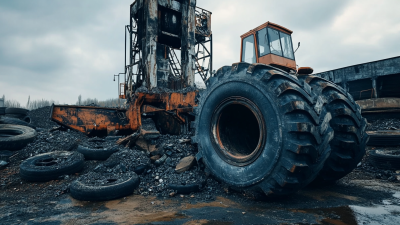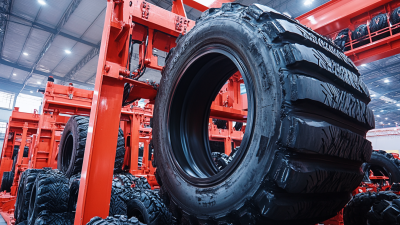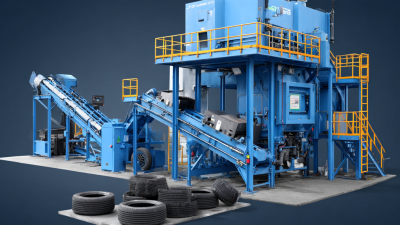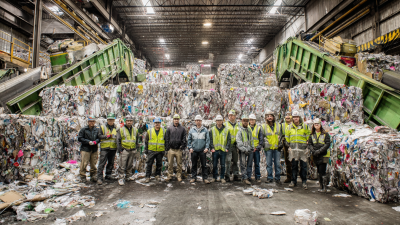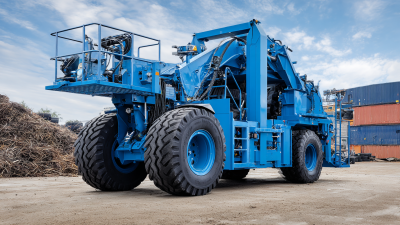The recycling industry has seen a remarkable transformation in recent years, with a significant shift towards sustainable waste management practices. One of the cornerstones of this evolution is the Tire Crushing Machine, a game-changing piece of equipment that has revolutionized tire recycling. According to a report by the Environmental Protection Agency, approximately 300 million tires are discarded every year in the U.S. alone, with only around 30% being recycled. This presents an enormous opportunity for businesses to invest in machinery that not only maximizes material recovery but also minimizes environmental impact. The Tire Crushing Machine plays a pivotal role in this process, as it efficiently breaks down waste tires into reusable materials, thereby facilitating a circular economy. By leveraging advanced technologies, this machine not only enhances operational efficiency but also positions recycling businesses to thrive in a growing market, where the demand for recycled materials continues to rise.

The tire recycling industry is experiencing significant growth, driven by increasing environmental awareness and strict regulations on waste management. According to industry statistics, the global tire recycling market is expected to reach billions of dollars within the next few years, highlighting its immense potential. As more businesses and individuals recognize the importance of recycling tires, investing in a tire crushing machine becomes an attractive opportunity for recycling companies looking to thrive in this expanding market.
One key benefit of tire recycling is its positive impact on the environment. By transforming used tires into reusable materials, businesses can reduce waste in landfills and lower their carbon footprint. This not only contributes to environmental sustainability but also opens avenues for profit from the sale of recycled materials.
Tip: When considering a tire crushing machine, evaluate its capacity and efficiency to maximize productivity. Additionally, ensure that the machine complies with safety standards to protect your workforce.
Another critical aspect to consider is the versatility of the materials produced from recycled tires. These materials, such as crumb rubber and steel, can be used in various industries, including construction, automotive, and sports surfaces.
Tip: Always research the demand in your local market for the products derived from tire recycling to capitalize on profitable opportunities.

Investing in a tire crushing machine can significantly enhance the cost efficiency of your recycling business. According to a report by the U.S. Tire Manufacturing Association, approximately 300 million tires are discarded annually in the United States alone. The ability to process these tires effectively not only helps in reducing landfill waste but also opens up various revenue streams. Each ton of recycled rubber can generate between $100 and $150, depending on market conditions. This potential income underscores the financial viability of tire recycling, making the initial investment in a tire crushing machine more than just a purchase—it's a pathway to profitability.
Furthermore, the return on investment (ROI) for tire crushing machines is compelling. A study from the Environmental Protection Agency (EPA) estimates that businesses could save up to 80% on disposal fees by recycling tires. Additionally, the operational costs of running a tire crushing machine are frequently outweighed by the savings in waste management and the ability to sell recycled materials. Operators report an ROI of 200-300% within the first few years, creating a sustainable, profitable operation that benefits not only the business but the environment as well. The data clearly indicates that investing in a tire crushing machine is a strategic move for any recycling business aiming to maximize efficiency and revenue.

The environmental impact of tire recycling machines is profound, making them an essential investment for any recycling business. By transforming used tires into reusable materials, these machines significantly reduce waste, preventing discarded tires from ending up in landfills. This not only conserves space but also mitigates the release of harmful chemicals that tires can emit as they degrade. In turn, tire recycling machines contribute to a circular economy, where materials are reused and repurposed, fostering sustainable practices across various industries.
Moreover, the process of tire recycling plays a critical role in reducing the carbon footprint associated with tire disposal. When tires are recycled, they can be transformed into valuable products like rubber mulch, playground surfaces, and even new tires. This not only minimizes the use of raw materials but also decreases the energy consumption and emissions linked to the production of new items. Investing in tire recycling machinery aligns your business with environmentally-friendly practices, showcasing a commitment to sustainability that resonates with eco-conscious consumers and clients alike.
The advancements in tire crushing machinery have revolutionized the recycling industry, with cutting-edge technologies enhancing performance and efficiency. Modern tire crushing machines utilize advanced hydraulic systems and high-speed rotary blades, significantly increasing throughput rates. According to a report by ResearchAndMarkets, the tire recycling market is expected to reach $6.7 billion by 2027, driven by innovations that reduce energy consumption and operational costs. This transformation helps businesses maximize their profits while adhering to environmental regulations.
Tips for choosing the right tire crushing machine include considering both the capacity and energy efficiency ratings. Look for models equipped with smart technology features, such as automated monitoring and control systems, which ensure optimal performance and minimal downtime. Additionally, investing in machines with modular designs can enhance flexibility, allowing for easy upgrades as technology continues to evolve.
Furthermore, the latest tire crushing machinery boasts enhanced safety features, reducing workplace accidents and improving operational reliability. The integration of artificial intelligence can predict maintenance needs, minimizing disruptions in production. As the industry grows, staying informed about technological advancements will empower recycling businesses to make strategic investments that yield significant long-term benefits.
In an era where environmental sustainability is paramount, tire recycling plays a crucial role in regulatory compliance for businesses. In the United States alone, approximately 290 million scrap tires are generated annually, according to the U.S. Environmental Protection Agency (EPA). Effectively managing these tires is essential not just for the environment but also for adhering to local and national regulations. States have established strict guidelines for tire disposal, making the adoption of tire recycling practices not only a responsible choice but a mandated one for many businesses.
Investing in a tire crushing machine simplifies the recycling process, allowing companies to convert scrap tires into reusable materials and comply with environmental standards. In fact, a study by the Rubber Manufacturers Association indicates that over 80% of scrap tires are now being recycled, driven by stringent regulations and the growing market demand for recycled rubber products. This equipment not only supports compliance but also opens additional revenue streams through the sale of processed materials.
Tips: To maximize compliance benefits, ensure your facility regularly updates its waste management practices in line with local regulations. Additionally, consider engaging with industry associations that provide resources and updates on recycling standards. Investing in employee training for operational best practices can further enhance your recycling efforts, making your business not only compliant but also a leader in sustainability.
